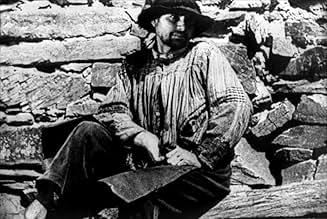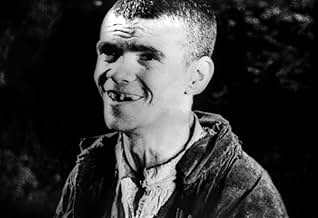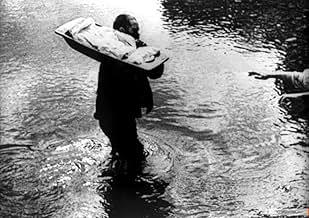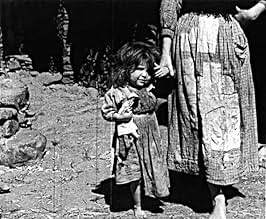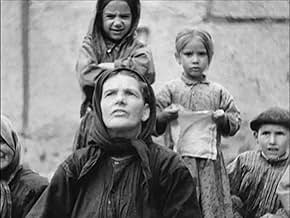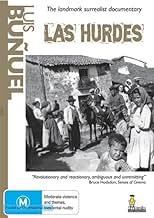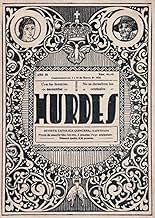IMDb RATING
7.3/10
6.6K
YOUR RATING
A surrealist film, a pseudo-documentary portrait of Las Hurdes, a remote region of Spain where civilisation has barely developed, showing how the local peasants try to survive without even t... Read allA surrealist film, a pseudo-documentary portrait of Las Hurdes, a remote region of Spain where civilisation has barely developed, showing how the local peasants try to survive without even the most basic utilities and skills.A surrealist film, a pseudo-documentary portrait of Las Hurdes, a remote region of Spain where civilisation has barely developed, showing how the local peasants try to survive without even the most basic utilities and skills.
- Director
- Writers
- Stars
Abel Jacquin
- Self
- (voice)
Alexandre O'Neill
- Self
- (voice)
- Director
- Writers
- All cast & crew
- Production, box office & more at IMDbPro
7.36.6K
1
2
3
4
5
6
7
8
9
10
Featured reviews
Unusual, Interesting, & Unsettling - As You Would Expect From Buñuel
Luis Buñuel's approach to film-making was so unusual, and his intentions so hard to decipher, that you can never be quite sure what his movies were meant to convey. So it should probably not be too surprising that even when he makes a documentary it is still hard to tell exactly what he was doing. While this gives every initial appearance of being a straightforward documentary, it is not long before Buñuel's detailed yet surrealistic approach begins to show in subtle ways.
Whatever else may be true, it is an unusual film, and a generally interesting one. It is also unsettling - at times, very much so. It depicts a civilization that, though located in the midst of Spain just before the Franco era, could almost be from pre-historic times. Many of the images and much of the commentary are disturbing and uncomfortable to watch, to say the least. Yet the tone is far from emotional, and in fact it seems to be deliberately withdrawn, even unsympathetic, much of the time.
At the same time, it's easy to see why there are those who suggest that Buñuel was not filming a strictly objective documentary. While there are no outlandish or fantastical images, his distinctive style shows up in less obvious ways, through odd details and sequences. There also seem to be a number of different versions of the narration, which do not always cast events in the same light. So, as so often tends to be the cast with Buñuel, all that you can do is to watch it for yourself and then make your best guess as to what it all means.
Whatever else may be true, it is an unusual film, and a generally interesting one. It is also unsettling - at times, very much so. It depicts a civilization that, though located in the midst of Spain just before the Franco era, could almost be from pre-historic times. Many of the images and much of the commentary are disturbing and uncomfortable to watch, to say the least. Yet the tone is far from emotional, and in fact it seems to be deliberately withdrawn, even unsympathetic, much of the time.
At the same time, it's easy to see why there are those who suggest that Buñuel was not filming a strictly objective documentary. While there are no outlandish or fantastical images, his distinctive style shows up in less obvious ways, through odd details and sequences. There also seem to be a number of different versions of the narration, which do not always cast events in the same light. So, as so often tends to be the cast with Buñuel, all that you can do is to watch it for yourself and then make your best guess as to what it all means.
Real Life or Propaganda: A call for help
I have ancestors from my father side who are originally from Las Hurdes. The highlands were exactly like the documentary film portrays them. The lowlands slightly better off, The documentary helped them because the world focused on them and offered some help. Finally a cementery was built and food imported. Problem is the civil war that followed shortly afterwards. Buñuel was a surrealist film director who tried to shift towards realism after joining the communist party. The civil war against communists and fascists further increased poverty but no films were allowed for decades under the dictatorship 1936-1975
Version important
I have been frustrated by the version of the film that is available in my area, entitled "Unpromised Land". The original "Tierra sin Pan" has a completely different commentary which is made "politically correct" in the "Unpromised" version. Avoid "Unpromised Land" as it censors and alters the original intent of the film as conceived by Bunuel!
Rather surprising, absolutely ahead of its time
I saw this movie with absolutely no idea what it would be about or when this movie was made, only that it was made by Luis Bunuel, and I felt I HAD to at least have seen 1 movie made by the man so many people see as one of the many movie gods.
I must add that before seeing Las Hurdes ("Land Without Bread") in the theatre where I saw it, they had programmed the documentary "Bunuel's Prisoners". In which the people of the Hurdes region comment on the movie and the circumstances under which this movie came to be. This movie gave me enough information to watch the main feature (Las Hurdes) with a much more realistic view than if I had seen this movie without seeing the doumentary first.
In the documentary several people express their annoyance and irritation with the manner in which Bunuel has twisted and fabricated some of the scenes in the actual movie/documentary. The goat falling from the cliff is not exactly falling per accident and the "dead" baby in one of the last scenes is not dead at all (this can be seen by watching the moving chest of the baby).
All in all I enjoyed this slightly fictional documentary very much and I recommend everybody to go see it. It will either make you laugh out loud at times and leave you deeply disturbed at other times.
A must for people who are not allergic to foreign movies from before WW2. 9/10
I must add that before seeing Las Hurdes ("Land Without Bread") in the theatre where I saw it, they had programmed the documentary "Bunuel's Prisoners". In which the people of the Hurdes region comment on the movie and the circumstances under which this movie came to be. This movie gave me enough information to watch the main feature (Las Hurdes) with a much more realistic view than if I had seen this movie without seeing the doumentary first.
In the documentary several people express their annoyance and irritation with the manner in which Bunuel has twisted and fabricated some of the scenes in the actual movie/documentary. The goat falling from the cliff is not exactly falling per accident and the "dead" baby in one of the last scenes is not dead at all (this can be seen by watching the moving chest of the baby).
All in all I enjoyed this slightly fictional documentary very much and I recommend everybody to go see it. It will either make you laugh out loud at times and leave you deeply disturbed at other times.
A must for people who are not allergic to foreign movies from before WW2. 9/10
Amazing documentary.
This is a fascinating documentary from Luis Bunuel about a little known people called the Hurdanos, who live primitive miserable lives in a remote region of Spain. Its hard to imagine that even in the early 20th century when this film was made, there were still people living in "civilized" Europe under the conditions shown in this film. Only a few years before this film was made did these people know of bread. They have only rudimentary farming skills. The narrator states that at no time did the film crew hear anyone sing or play music, so perhaps music is unknown to them. Malnutrition, pestilence, genetic disorders from inbreeding, and lack of proper hygiene plague these poor wretched people. This film shows them dying off in such high numbers, that one has wonder why these people didn't all die off or migrate to more hospitable terrain long ago.
Like so many other documentaries, some scenes were obviously staged for the camera, like the now notorious donkey falling off a cliff. We see the donkey falling in several different shots taken from different angles, which makes it unlikely the cameramen just happened to be there when the donkey fell.
Some people claim this film is an attack on Franco, but Franco didn't come to power until 1936. Actually I don't think this film was trying attack anyone. It merely does what I think its makers set out to do; try to capture the lives of a people who are very different from the rest of us.
Like so many other documentaries, some scenes were obviously staged for the camera, like the now notorious donkey falling off a cliff. We see the donkey falling in several different shots taken from different angles, which makes it unlikely the cameramen just happened to be there when the donkey fell.
Some people claim this film is an attack on Franco, but Franco didn't come to power until 1936. Actually I don't think this film was trying attack anyone. It merely does what I think its makers set out to do; try to capture the lives of a people who are very different from the rest of us.
Did you know
- TriviaLuis Buñuel was not above slaughtering several animals to deliver his message; he ordered the ailing donkey to be spread with honey so he could film it being stung to death by bees. Nor was the mountain goat falling off the mountain an accident, shot by Buñuel's crew for the desired sequence.
- GoofsIn the sequence where the mountain goat falls to its death, a puff of smoke can be seen on the side of the screen. This is from a gunshot by a crew member, who shot the goat so that it would fall and be filmed as if it 'accidentally' fell off of the mountain.
- ConnectionsFeatured in Histoire(s) du cinéma: Les signes parmi nous (1999)
Details
- Release date
- Country of origin
- Language
- Also known as
- Земля без хліба
- Filming locations
- La Alberca, Salamanca, Castilla y León, Spain(main town, on location)
- Production company
- See more company credits at IMDbPro
- Runtime
- 30m
- Color
- Sound mix
- Aspect ratio
- 1.37 : 1
Contribute to this page
Suggest an edit or add missing content

